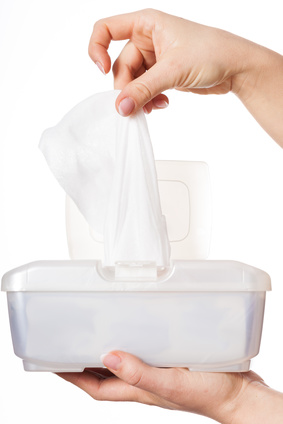What’s hiding in your wipes?
March 20, 2013

To wipe or not to wipe
I know, I know, wipes are seriously convenient when you’re on the go, but you probably know it’s definitely more sustainable to go the reusable cloth/wipe/rag route. You wipe junkies will have my head if I tell you to axe them from your life permanently, but can we agree to reducing? Let’s try a tradeoff. Cut out disposable wipes from your cleaning routine and home bodycare routine (that means NO using moist wipes instead of TP!) and keep the disposables for when you’re out and about. For the DIY route, an old flannel sheet cut up into squares works beautifully. Now what to look for when you’re shopping for greener wipes? Read the latest Ecoholic column on the topic! Here are a few bonus bits of info.
Rash-worthy ingredients
The thing with wipes is the chemical substances aren’t rinsed off, they get to stay on skin. Not good since so many wipes contain stuff like parabens and serious irritants. Also, just because the wipe says it’s natural, doesn’t mean it’s free of dodgy chemicals. Huggies Naturals wipes replaced formaldehyde- releasing DMDM hydantoin with methylchloroisothiazolinone/methylisothiazolinone. Not good! Dermatology journals have documented cases of sores, redness and itching on people’s behinds, hands, etc from using moist wipes that contain the preservatives (these bad boys are so irritating they’re on Health Canada’s hotlist of restricted ingredients).
Phenoxyethanol, while really common in paraben-free products like Aleva, can also trigger skin reactions with prolonged contact in some so isn’t desirable in products that stay on the skin. Ditto for cocamidopropyl betaine, which may really irritate some (like my mom!). FYI, phenoxyethanol used to be okayed by some organic certifiers like Ecocert, but Ecocert has since changed its mind.
Don’t believe the biodegradable hype
I’m glad there are so many wipes out there that are offering alternatives to typical petroleum-fibre materials (like polyester, etc), but be aware that if your wipes say they’re made of tree pulp or cellulose fibre, they’re mostly just rayon AKA viscose – yes, your wipes, too. Rayon/viscose fibre is made of tree pulp aka cellulose fibre and, as I say in the column, the Federal Trade Commission cracked down on bamboo rayon companies claiming their materials were biodegradable because, well, nothing biodegrades in your typical North American landfill – and city composters just skims all wipes out. Also processing tree pulp, even bamboo, into a soft fabric like rayon involves a lot of polluting chems. All this to say, your wipes really not going to biodegrade, so let’s try to use less of them. Deal?
